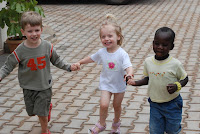“We match!” is a cry of delight from my two year-old. She likes to find matches between almost anything, colour of clothes, content of
Matching is also important for my son. This trip we have introduced the Memory Game – you know the one where you turn over a pair at a time trying to find a match. The winner is the one who finds the most matches. The game is fun, doesn’t take much space, and builds memory skills. It is a game that builds on something most of us want to do – find matches with others.
Going to a new place, the first thing I noticed was all the differences. The smells of sewage and burning garbage, the sight of 15-passenger taxis careening down narrow and cratered muddy dirt roads avoiding cows wandering in packs, and the sounds of the Muslim call to prayer mingled with blaring American Christian church music from the Pentecostal assembly in a nearby shack. However, as I have been in Uganda now for more than a week, I am also finding matches.
I have been blessed by conversations with women from various walks of life - priests, mothers, pregnant teenagers, ministry leaders, female theological students and household workers. These women share the challenges that I find in my own life – ensuring our family eats well, planning education for our children, balancing demands at work or school with family and personal commitments, trying to reduce commuting time, and following their sense of calling. The solutions to these challenges are different here. For example many children of middle class and upward families end up at boarding schools. Many women here still rise before dawn to prepare the day’s meals, wash clothes, clean floors and other household tasks. Others employ ‘helpers’ (usually young women, often extended family members) to do this.
My kids have asked why they don’t match in skin tone with the majority of those they see around them. At the same time they have seen beyond skin color and their new housing arrangements. The neighbour’s three-year old daughter is missed when she doesn’t come over to play. The five-month old baby daughter of our hosts has become my daughter’s best friend.
She’s right. We match – if not in color, culture or language, then at least in hopes and dreams.
No comments:
Post a Comment